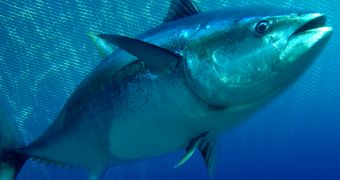As far as most people are concerned, seafood can be labeled as either wild or farmed, depending on where it grew and what happened to it before it hit the local markets.
However, it now seems that a third labeling possibility might soon be introduced: hybrid seafood. In spite of this misleading name, we are not dealing with fish species which somehow suffered some genetic mutations.
Quite the contrary, we are referring to seafood grown using a combination of production techniques, some of which taken from the fish farming industry and others taken from the fishing industry.
Apparently, researchers from the University of California, Santa Barbara claim that labeling some fish as “hybrids” is necessary in order to keep a closer eye on how our planet's fish stocks are currently managed and exploited, especially if we are to push for sustainable development in this particular branch of our food industry.
Specialist Mary Turnipseed wishes to make it as clear as possible that, “We need to start collecting more accurate data on how seafood is really produced in today's world, and a first step will be through replacing the old farmed-fished dichotomy with a farmed-fished-hybrid classification scheme.”
In order to back up their claim, these researchers bring forth the example of the Alaskan salmon. They argue that, although marketplaces label these fish as “all wild, never farmed,” as much as 40% of the Alaskan salmons sold under this classification actually originate in fish hatcheries.
According to the press release posted on the official website for the University of California, Santa Barbara, Mary Turnipseed also explained how, “Seafood production is a critical part of global food security, but the way we study and talk about it often obscures how to achieve the thing we care the most about: increasing the supply of sustainably produced seafood to feed a rapidly growing human population.”
For the time being, it is still unclear whether or not the United Nation's Food and Agriculture Organization will take their request into consideration.

 14 DAY TRIAL //
14 DAY TRIAL //